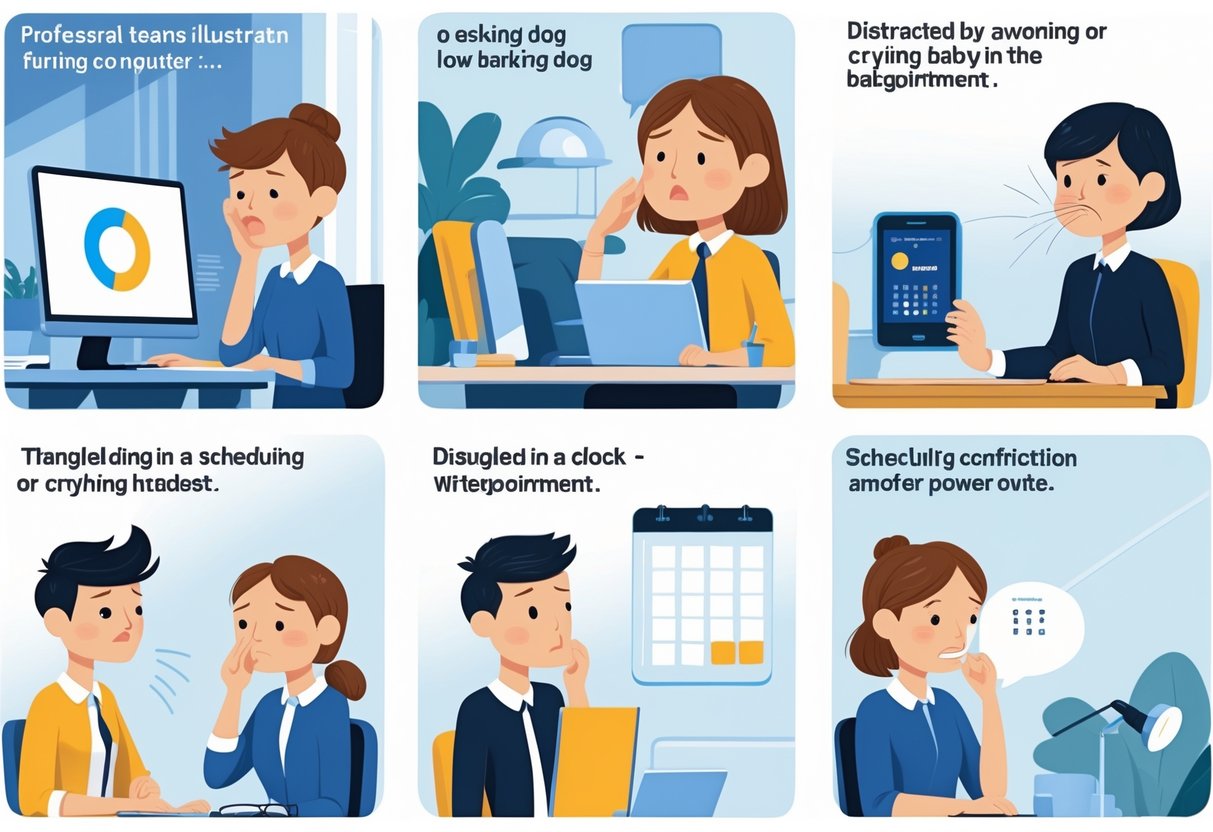Missing a Teams meeting at work can happen to anyone, whether due to sudden events or simple mistakes. When this occurs, it’s important to communicate clearly and responsibly.

Knowing the right excuses to use can help employees handle these situations professionally and maintain trust with their team. This article covers seven practical excuses for missing a work Teams meeting and gives straightforward suggestions for using them correctly.
1) Unexpected family emergency

An unexpected family emergency is a clear and acceptable reason for missing a Teams meeting. Emergencies involving close family, such as a sudden illness, accident, or urgent situation, can happen without warning. Most employers understand that these events require immediate attention and will allow an absence when explained quickly and honestly.
If possible, the person should notify their team or manager as soon as they are able. It is best to send a brief message stating there has been a family emergency and they will be unavailable for the meeting. Details can be kept private unless more information is requested.
Here is a copy-ready example someone could use:
“Hello [Manager’s Name],
I wanted to let you know that I have an unexpected family emergency and won’t be able to join the meeting today. I apologize for the short notice. I will catch up on any missed information and follow up as soon as possible. Thank you for your understanding.”
For tracking situations like this and managing communication, RoboApply can help professionals keep their records organized. Using RoboApply’s tools makes it easier to stay on top of tasks and maintain professionalism even during personal emergencies. For more excuse ideas, visit this list of family emergencies that are valid reasons to miss work.
2) Sudden illness or health issue

A sudden illness is a common and reasonable excuse for missing a Teams meeting. If an employee wakes up feeling sick, has a migraine, or deals with a stomach issue, it’s usually best for them to rest and recover. Being honest about health is important, and most workplaces accept illness as a valid reason.
Employers generally understand that health comes first. If someone feels too unwell to participate or focus, they should send a brief message to their team or manager explaining what happened. It helps to be clear and simple, such as, “I’m not feeling well today and need to miss the meeting to rest and recover.”
For written communication, employees can use a direct approach. Here is an example:
Hi [Manager’s Name],
I’m feeling unwell this morning and won’t be able to join the meeting today. I wanted to let you know as soon as possible. Please let me know if I need to follow up on anything after I feel better.
Thank you,
[Your Name]
If needed, RoboApply’s email CRM can help manage communication and keep track of absences. It also helps keep a professional tone and records in one place. For more ideas on clear and acceptable excuses, check out this list of good reasons for missing work.
3) Technical difficulties with Teams or internet

Technical issues are a common and understandable reason for missing a Teams meeting. These could be problems with the computer, internet connection, or login errors with Teams itself. Most managers accept this excuse if it does not happen often.
If someone cannot connect due to a sudden Wi-Fi outage or can’t get Teams to load, it is best to explain the problem honestly. Saying, “My internet connection suddenly dropped, and I was unable to access Teams until after the meeting ended,” is clear and direct. Mentioning a specific error, like “Teams kept crashing on startup,” adds credibility.
It helps to show efforts to fix the problem or join the meeting another way, such as, “I tried restarting my router, but it did not work in time.” Some find it useful to mention they used their phone or another device, but still could not connect.
For those using RoboApply’s job tracking dashboard, it can also be helpful to attach a screenshot or a short note about the technical issue. Keeping a brief record like this shows good communication and responsibility.
Some support the excuse by noting that Teams can have issues with slow networks, so network trouble is believable. Only use this excuse when it is true, and follow up when back online to stay professional.
4) Urgent childcare responsibilities

Childcare emergencies are a common and accepted reason for missing a work Teams meeting. When a child becomes sick, gets injured, or their regular caregiver is unavailable, employees are often left with no choice but to handle the situation themselves. Many workplaces understand these situations, especially when communicated clearly and promptly.
If this happens, it is important to let your manager know as soon as possible. Be direct about the situation but avoid sharing too many personal details. A polite and straightforward message is all you need for most workplaces.
Here is a complete example of what someone could write:
Hi [Manager’s Name],
I wanted to let you know I won’t be able to attend today’s Teams meeting due to an urgent childcare issue at home. I’ll do my best to catch up on any action items afterward and will check in as soon as things are settled. Thank you for your understanding.
If you need to send this kind of excuse regularly, consider using RoboApply’s email CRM to track your sent messages and follow up. This helps keep communication professional and organized. For more ideas, check out further examples of legitimate reasons to miss work like urgent childcare needs.
5) Car trouble or transportation delay
Car trouble or transportation delays are common reasons to miss a Teams meeting. This excuse works best if there is a pattern of reliability in your attendance. Problems like a flat tire, a dead battery, a bus breakdown, or a public transport delay can prevent someone from getting to work or joining on time.
It is important to let your manager or team know as early as possible if you are dealing with this kind of issue. A quick message or call—along with a short explanation—shows that you are responsible and not just skipping the meeting without notice.
Tip: Always keep proof, like a receipt from a tow truck or a screenshot about a train delay, in case someone asks later. Using RoboApply’s job tracking dashboard can help keep you organized so you never lose details when communicating about scheduling or unexpected absences.
Example message: Hi [Manager’s Name], I’m unable to join the Teams meeting this morning due to unexpected car trouble. My car wouldn’t start, and I’m waiting for a tow. I’ll keep you updated and review the meeting notes as soon as I can. Sorry for the inconvenience.
6) Unplanned home repair, e.g., burst pipe
Sometimes home emergencies, like a burst pipe or flooding, make it impossible to attend a Teams meeting. Water damage or emergency repairs often require quick action and cannot be delayed. Most employers understand that these sudden issues need immediate attention, especially when there’s a real risk to property or safety.
When using this excuse, it helps to explain the emergency clearly, give an estimate of when you’ll be available, and follow up as soon as the situation is handled. If possible, notify your manager or team as soon as you discover the problem. Being honest and upfront will often help maintain trust.
Here is a complete example you can use to notify your team:
Hi Team,
I’m unable to attend today’s meeting due to an emergency at home. A water pipe burst this morning, and I need to be here for urgent repairs. I will keep you updated and do my best to catch up on any information I miss. Please let me know if there are action items I need to follow up on.
Thank you for understanding,
[Your Name]
This kind of message is straightforward and respectful, making it easier for colleagues to adjust. If you use RoboApply’s job tracking dashboard, you can also flag this type of absence for your personal records or future reference. For more helpful examples of valid excuses, you can review guidance from career advice sites or workplace advice resources.
7) Conflicting urgent work commitment
A conflicting urgent work commitment is a common and valid reason for missing a Teams meeting. This excuse works best when a high-priority task comes up at the last minute, and the person truly needs to focus on it instead of attending the meeting. Managers and coworkers usually understand when project deadlines or time-sensitive issues need immediate attention.
If someone has to miss a meeting, they should let the organizer know as soon as possible. A simple and honest message explaining that another urgent task needs their attention is often enough. It’s important to show respect for everyone’s time and avoid overusing this excuse.
Here is a practical message someone can use:
Hello [Meeting Organizer],
I wanted to let you know that I have an urgent work commitment that needs my immediate attention and I won’t be able to attend today’s meeting. I apologize for any inconvenience this may cause. Please share the meeting notes with me afterward, and let me know if there are any action items I should prioritize.
Thank you for understanding.
RoboApply recommends being prompt and clear when sending this type of message, and suggests keeping communication professional at all times. This helps build trust and keeps teamwork strong. For even easier follow-up, use tools like RoboApply’s email CRM to track responses and stay on top of important conversations.
Frequently Asked Questions
Clear communication and prompt updates are crucial when you can’t attend a work meeting. Stating a specific, understandable reason for your absence builds trust and helps teams plan around sudden changes.
What are some acceptable reasons for not attending a work meeting?
Acceptable reasons often include a sudden family emergency, unexpected illness, urgent childcare needs, or unavoidable technical problems. These explainable events are generally considered valid by managers and colleagues in most workplaces. For more ideas, see this list of good excuses for missing a meeting.
How can I professionally apologize for missing a meeting?
Apologizing should be simple and direct. State the reason you couldn’t attend, express regret, and offer to catch up on what you missed. Use clear language and send the apology quickly, either in email or chat. Tools like RoboApply’s email CRM can help draft and send professional apologies to teammates or supervisors.
What is a legitimate last-minute excuse for missing a meeting?
Legitimate last-minute excuses include unexpected illness, family emergencies, sudden childcare issues, or urgent car trouble. These reasons are usually understood by teams if communicated promptly. If technology fails, such as a sudden internet outage, mention it specifically.
How should I inform my team if I can’t make it to a scheduled meeting?
Inform your team as soon as possible by chat, email, or your company’s preferred communication tool. Include the specific reason, the meeting you’ll miss, and any steps you are taking to stay on track. RoboApply’s job tracking dashboard helps keep your commitments organized and can remind you to notify colleagues when changes come up.
What excuses for skipping an online meeting are generally acceptable?
Technical issues like internet connectivity problems, urgent family emergencies, and sudden health problems are usually accepted as valid excuses for skipping an online meeting. For a full list of commonly accepted reasons, check out these valid excuses for missing a meeting.
How do I explain an unplanned absence from a work meeting?
Offer a brief, direct explanation such as “I had a family emergency and could not attend.” Apologize for missing the meeting, and ask if you can review the notes or follow up with someone for a summary. RoboApply’s interview coaching assistant can help users phrase professional messages for these types of situations.

















